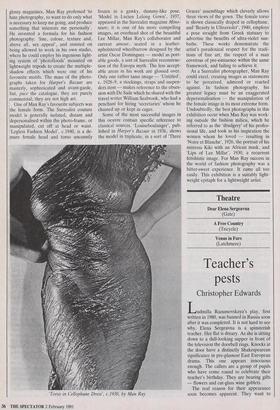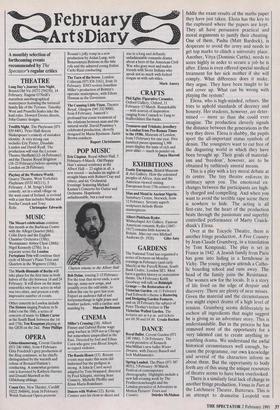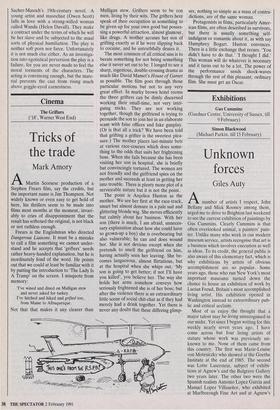Theatre
Dear Elena Sergeavna (Gate) A Free Country (Tricycle) Venus in Furs (Latchmere)
Teacher's pests
Christopher Edwards
Ludmilla Razumovskaya's play, first written in 1980, was banned in Russia soon after it was completed. It is not hard to see why. Elena Sergeavna is a spinsterish teacher. Her flat is dreary. As she is sitting down to a dull-looking supper in front of the television the doorbell rings. Knocks at the door have a distinctly Shakespearean significance in pre-glasnost East European drama. This one appears innocuous enough. The callers are a group of pupils who have come round to celebrate their teacher's birthday. They are bearing gifts — flowers and cut-glass wine goblets.
The real reason for their appearance soon becomes apparent. They want to fiddle the exam results of the maths paper they have just taken. Elena has the key to the cupboard where the papers are kept. They all have persuasive practical and moral arguments to justify their cheating. One of them, Pasha (Matt Bardock), is desperate to avoid the army and needs to get top marks to clinch a university place. Another, Vitya (Dominic Curtis), needs to score highly in order to secure a job he is after. Elena is even offered special medical treatment for her sick mother if she will comply. What difference does it make, they argue. They have been taught to lie and cover up. What can be wrong with playing the system?
Elena, who is high-minded, refuses. She tries to uphold standards of decency and honesty. Her students, however, are deter- mined — more so than she could ever in-iagine. The production cleverly signals the distance between the generations in the way they dress. Elena is shabby, the pupils sport the all-important status symbols of denim. The youngsters want to cut free of the disgusting world in which they have been brought up. Their goals of material- ism and 'freedom', however, are to be obtained by ruthlessly amoral means.
This is a play with a key moral debate at its centre. The tiny theatre enforces its intimacy upon you. The emotional ex- changes between the participants are high- ly charged and compelling. And when you want to avoid the terrible rape scene there is nowhere to hide. The acting is all first-rate, but the heart of the production beats through the passionate and superbly controlled performance of Marty Cruick- shank's Elena.
Over at the Tricycle Theatre, there is another fringe production, A Free Country by Jean-Claude Grumberg, in a translation by Tom Kempinski. The play is set in France in 1942. A Jewish family from Paris has gone into hiding in a farmhouse in Vichy. The young nephew attends a Catho- lic boarding school and runs away. The head of the family joins the Resistance. The women sew for the locals. It is a story of life lived on the edge of despair and discovery. There are plenty of near misses. Given the material and the circumstances you might expect drama of a high level of tension. Grumberg seems deliberately to eschew all ingredients that might suggest he is giving us an adventure story. This is understandable. But in the process he has removed most of the opportunity for a very talented cast to create anything re- sembling drama. We understand the awful historical circumstances well enough, be- cause the programme, our own knowledge and several of the characters inform us about them. But the opportunity to body forth any of this using the unique resources of theatre seems to have been overlooked.
There is a similarly fatal lack of charge in another fringe production, Venus in Furs at the Latchmere Theatre, Battersea. This is an attempt to dramatise Leopold von Sacher-Masoch's 19th-century novel. A young artist and masochist (Owen Scott) falls in love with a strong-willed woman called Wanda (Helen Duvall). They make a contract under the terms of which he will be her slave and be subjected to the usual sorts of physical humiliation. The play is neither soft porn nor farce. Unfortunately it is not much else either. As an investiga- tion into egotistical perversion the play is a failure, for you are never made to feel the moral torments of the characters. The acting is convincing enough, but the mate- rial prevents the cast from rising much above goggle-eyed earnestness.




















































 Previous page
Previous page